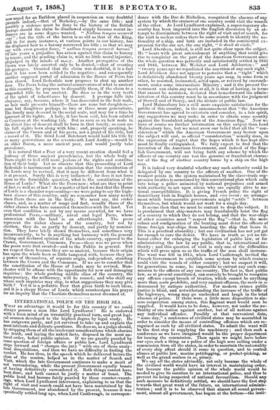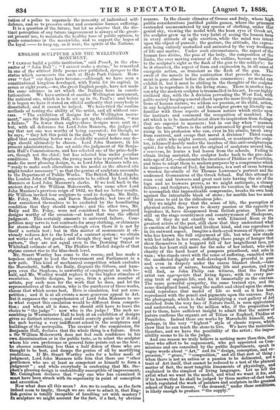INTERNATIONAL POLICE ON THE HIGH SEA.
WHIT an advantage it would be for this country if we could always possess a man like Lord Lyndhurst ! He is endowed with a keen mind of an irresistibly practical turn, and great logi- cal acumen developed to the highest degree by legal study. He has outgrown party, and yet survived to take up and explain the most intricate and delicate questions. He does so, as a judge should, by stripping them of all the irrelevant considerations which obscure the truth, and laying the naked facts, disposed in the most na- tural order, before public opinion. If we are greatly puzzled by some question of foreign affairs or public law, Lord Lyndhurst steps forivard and "charges the jury" with one of those analy- tical. disquisitions, and then we have no difficulty in finding the verdict. He has thus, in the speech which he delivered before the close of the session, helped us in the matter of Search and Visit, which the late Government continues to make a merit of not surrendering, while the present ,Government equally boasts of having definitively surrendered it. Both things cannot have been done, and both cannot be justly a matter of boast. The public head had become fairly puzzled by these counter-vaunt- Ingo, when Lord Lyndhurst intervened, explaining to us that the right of visit and search could not have been maintained by the late.Governinent, nor abandoned by the present, because it was specifically settled long ago, when Lord Castlereagh, in correspon-
dence with the Due de Richelieu, recognized the absence of any system by which the cruisers of one country could visit the vessels of the other. As Lord Lyndhurst explained, a supererogatory ob- scurity has been imported into the English discussion by an at- tempt to discriminate between the right of visit and of search, for
the visit is useless unless there be some search to identify the na- tionality of a ship, and both are included in the continental ex- pression for the one act, the one right, " le droit de visite."
Lord Aberdeen, indeed, is still not quite clear upon the subject. He " hears with great astonishment of anything that could give rise to complaint on the part of the American Government since the whole question was perfectly and satisfactorily settled in 1842 and 1843, between Mr. Webster and Lord Ashburton ; " and " twenty years ago we repudiated the assertion of any such right."
Lord Aberdeen does not appear to perceive that a " right " which is definitively abandoned twenty years ago may, in some form or
other, be asserted, insinuated, acted upon, or revived by encroach- ment, under some intermediate Ministry; and it the present Go- vernment can claim any merit at all, it is that of having, in terms that cannot be mistaken, declared that henceforward the admin- istration of this country must be in accordance with the judgment of Stowell and of Storey, and the dictate of public law. Lord Malmesbury has a still more exquisite satisfaction for the public of this country, in the announcement that "the American Government has agreed to entertain and. consider, in a fair spirit, any suggestions we may make in order to obtain some security against the fraudulent adoption of the American flag." Now we have of course no further information on this subject than Lord Malmesbury has, but we must avow our belief that all the "con- sideration' which the American Government may bestow upon the subject will end, as official " consideration " usually does in the expression of regret that the hopes which it has kept alive must be finally extinguished. We fully expect to find that the invention of the American Government, and indeed of the Eng- lish Government, will not bring forth any scheme by which the officers of one country can test the genuine or fraudulent charac- ter of the flag of another country borne by a ship on the high seas.
It is indeed very doubtful whether any such authority could be delegated by one country to the officers of another. One of the weakest points in the system maintained by the slave-trade sup- pression treaties is occasioned by this conventional plan which calls into being a police animated by national prejudices and armed
with authority to act upon aliens who are equally alive to na- tional susceptibilities. It is giving French police the right of domiciliary visit in English houses, and rice versa ; an arrange- ment which bureaucratic governments might " settle " between themselves, but which would not work for a single day.
It seems then that we must be content to drop the subject. It is proclaimed that ship-masters may fraudulently hoist the flag of a country to which they do not belong, and that the war-ships of other countries must respect the flag"—that is, the mere colour and configuration of the bunting must deter the officers of those foreign war-ships from boarding the ship that bears it. This is a practical absurdity ; but our civilization has not yet got far enough to cure the defect. We have in truth as yet no tri- bunal either for enlarging the legislation of public law,- or for . administering the law by any public, that is, international au- thority; and this question of visit is only one of the difficulties which will press upon us as the traffic of the seas shall increase. The want was felt in 1815 when Lord Castlereagh invited the French Government to establish some system by which cruisers could visit the vessels of either country ; but we suspect it will, for generations to come, be impossible to entrust any such com- mission to the officers of any one country. The fact is, that public law, as at present constituted, can scarcely be brought to recognize
any offence except breach of treaties, Which cannot be anything more than mala prohibita, and very ancient offences, the mala in se
denounced by antique authorities. For modern crimes public
justice is blind, and notwithstanding the increase of the traffic of the highways, wrong may go unchecked and laugh in the total absence of police. It' there were a little more disposition to sin- cere cooperation among states, this flagrant want would soon be supplied. It would have to be done, however, not under the au- , thority of one nation against another, but of all nations against any individual offender. Possibly at that convenient date, "some day," a conference of civilized states may be assembled in order to consider the means of controlling offences which are re- cognized as such by all civilized states. To admit the want will be the first step to supplying the machinery; and then such a conference as we have imagined would be the proper department for issuing the commission. Then again we might have before our eyes such a thing as a police of the high seas sailing under a commission from all the states, in order to ascertain the nationality of every ship afloat should it come in question, and to control abuses at public law, marine pettifogging, or pocket-picking, as well as the grand malum in se piracy. We say all the states advisedly, not only because the whole of the civilized world would have an interest in maintaining order, but because the public opinion of the whole world would be needed to give its sanction to an international police, and thus to prevent its being suspected of national favouritism. Should any such-measure be definitively settled, we should have the first step tewards that great want of the future an international adminis- tration ; and it is to be observed that almost all sound govern- ment, almost all government, has begun at the bottom—the insti-
tntion of a police to supersede the necessity of individual self- defence, and so to preserve order and economise human suffering. It is a question of the future, but let us observe that the dis- tinct perception of any future improvement is always of the great- est present use, to maintain the healthy tone of public opinion, to guide conscience in the meanwhile, and to support the hopes of the loyal — to keep up, as it were, the spirits of the Nations.



































 Previous page
Previous page